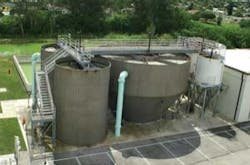Produced water treatment permit obtained by Siemens in Wyoming
WARRENDALE, PA, March 9, 2010 -- Siemens has received a Wyoming statewide Chapter 3 permit for treatment of produced water. The permit enables Siemens to expedite produced water services, since the pilot requirements and system configuration have already been reviewed by the state. The permit application was modeled after an existing plant in the Powder River Basin that uses Siemens' equipment to treat coal-bed-methane-produced water to Powder River discharge standards. While the permit is specific to the reverse osmosis/recovery reverse osmosis (RO/RRO) process, it encompasses both fixed plant and mobile services.
McLaughlin Water Engineering Ltd. of Denver, Colorado, represented Siemens to the Wyoming Department of Environmental Quality (WDEQ) for the permit application. McLaughlin evaluated over a year's worth of operating data at the Powder River Basin plant, and evaluated Siemens' RO/RRO treatment design for reliability and robustness. The design allows the system to operate very efficiently, with recoveries typically greater than 93%.
"The state of Wyoming requires a comprehensive review for any proposed water plant treating impacted waters to a discharge standard," says James Welch, Siemens' Business Development Manager for Produced Water Services. "By receiving this permit, Siemens can expedite construction plans or deployment of mobile assets, as preliminary requirements have already been addressed through the permitting processes. This will benefit our CBM-produced-water customers because of the shorter time required to initiate construction of water plants or receive our mobile equipment."
Because of the degree of variability in produced water, depending on the formation, any pretreatment to the RO/RRO system would still need to be reviewed by state regulators before deployment to the customer's site.
Siemens offers fixed plant and mobile services through build-own-operate (BOO) contracts. This arrangement allows customers to focus on their core business while Siemens handles the design and operation of the water or wastewater treatment system. Mobile assets are deployed upon customer request and supported by Siemens' personnel in Gillette and Buffalo, Wyoming.
The Siemens Industry Sector (Erlangen, Germany) is the worldwide leading supplier of environmentally friendly production, transportation, building and lighting technologies. With integrated automation technologies and comprehensive industry-specific solutions, Siemens increases the productivity, efficiency and flexibility of its customers in the fields of industry and infrastructure. The Sector consists of six divisions: Building Technologies, Drive Technologies, Industry Automation, Industry Solutions, Mobility und Osram. With around 207,000 employees worldwide (September 30), Siemens Industry achieved in fiscal year 2009 total sales of approximately €35 billion. http://www.siemens.com/industry
The Siemens Industry Solutions Division (Erlangen, Germany) is one of the world's leading solution and service providers for industrial and infrastructure facilities comprising the business activities of Siemens VAI Metals Technologies, Water Technologies and Industrial Technologies. Activities include engineering and installation, operation and service for the entire life cycle. A wide-ranging portfolio of environmental solutions helps industrial companies to use energy, water and equipment efficiently, reduce emissions and comply with environmental guidelines. With around 31,000 employees worldwide (September 30), Siemens Industry Solutions posted sales of €6.8 billion in fiscal year 2009.
Further information and downloads at: http://www.siemens.com/industry-solutions
###

